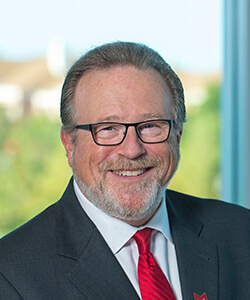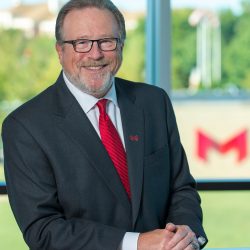Opportunity Gap in Higher Education


The opportunity gap in education refers to the way that capable students become derailed from their educational pathways through factors outside of their control. In addition to forces outside the school system itself — such as student socioeconomic barriers and family turmoil — higher education routinely fails students who, if given the right support, would have the ability to attain the educational and career achievements they aspire to.
Maryville University President Dr. Mark Lombardi views higher education as an industry in crisis — but also as one ready for an “access and opportunity revolution.” Universities need to do more to leverage data analytics, AI, and content management to empower learners, engage employers, and drive educators to unlock the potential of higher education, as Dr. Lombardi described in his SXSW EDU 2022 speech.
Tapping the Digital Revolution to Support Students
How can harnessing technological advancements in data analytics and AI meet the need for higher education to become more agile and flexible?
Dr. Lombardi believes the global COVID-19 pandemic has accelerated the digital revolution, providing the “catalyst of verifiable individual data (C.O.V.I.D.).” According to his learner-centered model of higher education, students can be empowered through the strategic use of learner-owned data, advanced data analytics, and employer partnerships that bridge the gap between classroom learning and real-world experience.
Learner-Owned Data
For Dr. Lombardi, universities that do nothing with their data are doing students a disservice. Learner data — which can include everything from test scores and grades to professor feedback and advisory notes from career counselors — ought to be accessible to students in a centralized, digital format.
Dr. Lombardi believes that giving learners ownership over their own data means they will have more of the tools they need for continuous learning and skill development at any point in their careers. “We can take the learner data and empower them with choices, actions, and outcomes — without dependency on a lot of cumbersome engagement,” he said.
Advanced-Data Analytics Applied to Education
Data, even in student hands, may mean little without insights. To make the most of their education data, students need a way to make their data actionable.
Dr. Lombardi envisions a university that uses its technological resources to conduct robust data analytics — collecting, digesting, and interpreting learner data to create personalized experiences for their students to meet individual needs and career goals.
Employer Partnerships
Students often pursue higher education as a step toward meeting career goals. However, universities often fail to work directly with employers and industry professionals. Dr. Lombardi believes in thoughtful collaboration between university leaders and leaders in tech, healthcare, business, and other major industries that are hungry for college graduates entering the workforce with specific skills and experience.
As Dr. Lombardi describes, partnering with employers can create a shared language so that learners can demonstrate the value of their education and skillsets to future employers seamlessly. This change could benefit employers and students alike: “Employers don’t have to decipher what this degree means — they don’t have to look at a transcript to try to figure it out.”
Improving Access to Education with Modularized Content
Next, consider Dr. Lombardi’s new approach to content management in higher education: an accessible, modularized content system that facilitates an “array of education and skill development” opportunities for learners.
In his vision for Maryville, a change to a subscription model of education — similar to a subscription to popular media streaming platforms and software programs — could facilitate ongoing learning throughout a student’s lifetime and through career changes long after graduation.
Empowering Students with the Living Learning Model
Dr. Lombardi’s transformation vision for Maryville includes taking steps to replace the outmoded, traditional education model. In traditional educational contexts, information remains siloed and gated behind class sequences (so that, for example, “advanced” or upper-division classes can only be taken by students who declare a major).
By contrast, Dr. Lombardi envisions higher education with a “living-learning model” that tailors content and pedagogy to each student, creating a personalized, lifelong learning experience that empowers learners and employers alike. Instead of locking classes behind long lists of prerequisites, Dr. Lombardi thinks that students should have access to the courses that excite them.
As part of its exploration in developing a living-learning model, Maryville has engaged in ongoing experiments with cutting-edge technology to improve learner experiences. Two such experiments involve artificial intelligence (AI) and personal digital learner profile programs:
- AI Pilot Programs. Maryville is studying the effects of using a sophisticated AI network to improve the student and alumni experience.
- Personal Digital Learner Profiles. Dr. Lombardi has a vision for unleashing talent by developing a robust digital profile for each individual learner. Learners could use these profiles throughout their lives for personal development and career growth.
How Maryville University Is Closing the Opportunity Gap in Education

Maryville University’s learner-centered investment in advanced technology aims to create more personalized learning environments, empowering learners to easily navigate higher education, reach their career goals, and access high-quality education throughout their lifetimes.
A digitally connected campus can empower student-centered, personalized learning opportunities across multiple platforms — and that’s exactly what leaders like Dr. Lombardi, president of Maryville University, want to provide for students.
Recommended Reading
Dr. Lombardi at SXSW Edu 2022: Access and Opportunity in Higher Education
Maryville’s Approach to Technology and Higher Education in the Digital Age
Emerging Leaders in Higher Education
Sources
Cheddar News, “President of Maryville University on Remote Learning”
EdSurge Podcast, “Why One University Is Moving Toward a Subscription Model”

